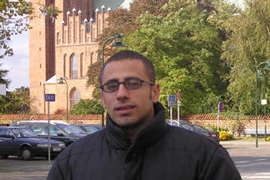Lebanon’s graduate crisis
Lebanese academics and ministers are worried about Lebanon’s “brain drain”.

The exodus of graduates and soaring unemployment have prompted the Lebanese government to consider a package of incentives aimed at turning the economic crisis around and averting a “brain drain”.
Keep reading
list of 4 items‘Triple spending’: Zimbabweans bear cost of changing to new ZiG currency
Boeing hit with 32 whistleblower claims, as dead worker’s case reviewed
US imposes new sanctions on Iran after attack on Israel
Those in the jobs market cite numerous endemic problems: a lack of confidence in local education, restrictive labour laws and the age-old system of favours, referred to as Wasta in Arabic.
Academics say that deep-rooted psychological issues among the Lebanese and a recent history of civil war and conflict are responsible for making many bright graduates decide to leave the country, because there are so few jobs at home.
 |
|
A degree course in Lebanon could cost students |
According to a study released this month by the ministry of social affairs, titled the 2004 National Survey of Household Living Condition, a fifth of unemployed workers have a bachelor’s degree and 34 per cent have been searching for a job for at least a year.
Economists believe that the war with Israel this summer left about 25,000 without work in the tourist sector alone, Lebanon’s biggest industry.
But many graduates believe that Wasta is the biggest problem.
|
“The future does not look bright for Lebanon’s youth”
Kanaan Samer, musician
|
Trad Hamade, who recently resigned as labour minister over a parliamentary dispute, said that Wasta was poisoning the Lebanese economy.
Hamade said: “Wasta? That’s an old Arab urban legend, and it is a poison in all Arab countries, and we need to get rid of it, as it is a social problem.”
Kanaan Samer, 27, who graduated in marketing four years ago and is fluent in English, French and Arabic, said: “Lebanon is about Wasta. Sad to say from the top to bottom it’s corruption. People hire on the basis of your religion, sect, creed, family and friends and it is wrong.”
Unlike many Lebanese graduates, Samer, who has been unemployed for almost three years but who has an interest in the music industry, said that he earns enough money from his hobby to get by.
“I set up a small recording studio in my bedroom and started recording local bands and solo artists,” he said.
Pessimistic about the future, he said: “Everyone is leaving to work abroad, and people are wasting their intelligence if they stay. This will affect the future of Lebanon.”
Government plans
The Lebanese government has promised reforms and incentives for the private sector to hire Lebanese graduates, and to repair the fragile economy.
|
“We have to stop the young minds of Lebanon from leaving” Trade Hamade, former labour minister |
Apart from the tourism industry, government figures show that at least 10,000 more Lebanese have been made unemployed in other sectors since the end of the Israeli bombing.
Hamade, a member of Hezbollah, said: “The [labour] ministry is working on a benefit plan to pay those who have been made unemployed.”
The government plans to introduce an unemployment allowance for those who lost their jobs, paying 60 per cent of their previous salary to single workers and 70 per cent to those who have families.
But for many, the problem did not start when Israeli jets bombed Lebanon’s infrastructure.
Many graduates say the labour laws have not helped.
Hamade believes that the private sector has a key role to play in creating jobs needed to prevent the brain drain, and says that changes to the tax system and labour laws will improve the situation.
To revitalise the economy, the labour ministry wants to introduce salary caps and a law to make it easier for companies to hire and fire people.
Asked about unemployment, Hamade said it was hovering at about 14 per cent, but analysts believe it to be higher.
Economic stability
Anis Bou Diab, an economist at Haigazian university in Beirut, estimates that since the war in summer, 25,000 people have lost their jobs in the tourism sector alone, many of them graduates, most of whom have left for jobs abroad.
|
“Job offers are very low, and demand is high” Abir Takieddine, economist |
“The loss in human capital was tremendous … More than 200,000 left the country – most of them skilled labour. This will greatly reduce productivity,” he said.
Abir Takieddine, who teaches economics at the Middle East Canadian Academy of Technology (Mecat) in Beirut, says that Lebanon is undergoing a period of “concentrated pressure”.
“Job offers are very low and demand is high, and the concentration of jobs isn’t broad,” she said.
“The Gulf states gain from this, as the Lebanese workforce there is tremendous. They don’t even get the salaries they deserve, but they leave because of the stability of a place such as the United Arab Emirates or Qatar.
“There are jobs available in Lebanon, but they are specialised and niche.”
Takieddine recommends students to study technical subjects and to move away from marketing and business degrees as the market is flooded with graduates from those disciplines.
Living abroad
 |
| Zunji has found it cheaper to study in France than in Lebanon |
For those who get visas to work abroad, life can be easier.
Ameen Zunji, 27, who graduated in 2002 from Holy Spirit University, Beirut, spent a year looking for a job in Lebanon, despite speaking five languages, before leaving for France.
He is now working at the Sofitel hotel in Paris, and is continuing his education part-time at a university there.
He says that Lebanese companies do not trust the standard of education at local universities and prefer to hire graduates who have studied abroad.
“If you have Wasta, or a foreign degree, then that’s what gets you a job,” he says.
Costs also play a part. Zunji says enrolling on a part-time master’s degree course in Lebanon could have cost him $14,000 for two years; now he pays $300 a term.
“The Lebanese society is all about fashion, if it suddenly becomes cool to hire local educated graduates, then many would get a job here immediately,” Zunji said.
Depression
Hanine Hout, a psychologist at Mecat, says that difficulties in finding work lead to psychological problems.
|
“Even the best university in Lebanon sees cases of depression,” Hanine Hout, psychologist |
Hout is now counselling up to five students a week, whereas in the past it was one or two.
“Depression is common. My classrooms are full of depressed students, and it is more widespread than before. You can tell students are not having fun, they are not motivated anymore,” she says.
Hout also said that the rising cost of tuition fees has had an impact on the number of universities applicants as students are apprehensive about committing to a university course while the political situation is unresolved.
She believes that even students from leading universities are struggling to climb the employment ladder.
Lebanon‘s universities
Many believe that the American University of Beirut (AUB), Lebanon’s foremost academic institution, is the most popular university in the Middle East.
Twenty per cent of its students come from overseas, but it is also one of the most expensive universities in the Arab world. Students pay anything from $11,000 to $16,000 for a degree course.
Hagazian university, which is seen by many as AUB’s main competitor, charges $4,000 for an undergraduate course.
Jad Ghnam, is an AUB graduate working in Doha, Qatar. He graduated in July 2002, with a bachelor’s degree in computer science, and found work abroad immediately.
When asked why he left Lebanon, he said: “I guess it’s the lack of job opportunities and the low salaries.”
Although he did not claim that graduating from AUB gave him an advantage abroad, he said: “There are many Lebanese working abroad that gained degrees from other institutions. The AUB definitely helps in Lebanon because it has a brand name.”
Samer Nazal, 27, a 2003 business management graduate from Kasleek university, is still unemployed.
“Looking for a job for such a long time is not a nice feeling, I have no money. I would leave Lebanon tomorrow for work. AUB students get jobs, but they are mainly upper-class students who can afford to pay over the roof for their education.
“You can’t live in Lebanon on $300 a month, which is the average salary for a graduate.”